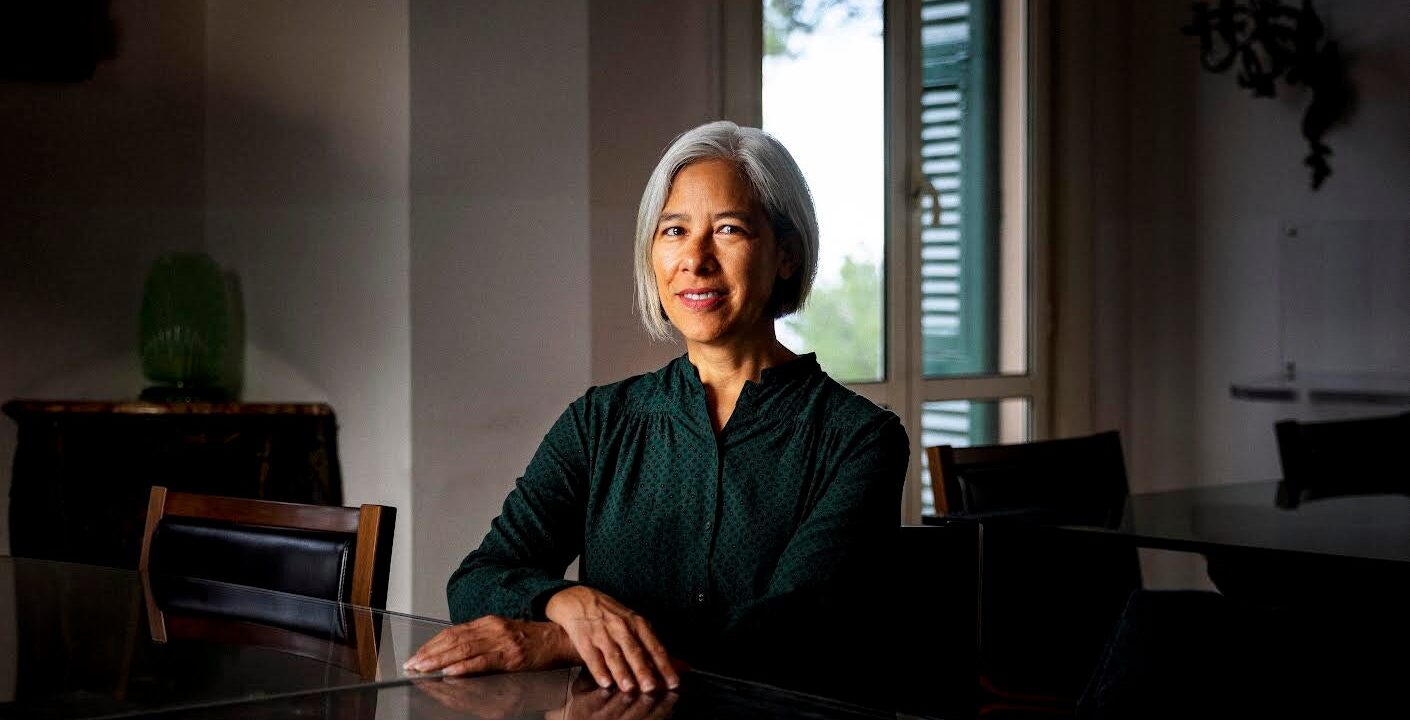Susan Choi is celebrated for crafting novels that draw profound depth from very particular settings—whether it’s a high school theater program in Trust Exercise (2019), a sexually charged university atmosphere in My Education (2013), or a fugitive life evading the FBI in American Woman (2003). Her newest novel, Flashlight (now available from Macmillan Publishers), may be her boldest work yet.
In Flashlight, a Korean man named Serk (formerly Seok) leaves his youth in Japan behind to start anew in the United States. The story unfolds as a sweeping chronicle of four generations of his family, with Choi’s precise, emotionally resonant prose shining throughout.
Recently, Vogue spoke with Choi about how winning the 2019 National Book Award influenced (or didn’t influence) her writing process for Flashlight, her research into Korean-Japanese history, and her fascination with stories of abduction. The conversation has been edited for clarity and length.
Vogue: How did you approach writing this book?
Susan Choi: Honestly, the process was… I don’t want to say chaotic, because that suggests a lot of energy and movement. It was more slow, meandering, and confusing—like someone blindfolded trying to navigate a maze. I really struggled with this book. It came together in disconnected bursts of writing that forced me to backtrack and go in circles. It felt more like writing my first novel than my sixth. At times, I wondered if I even knew how to write a book at all.
Vogue: Did winning the National Book Award for Trust Exercise affect how you approached Flashlight?
Choi: Surprisingly, no—and I’m grateful for that. I thought something like that would stress me out, but it barely registered. In a strange way, COVID helped. The pandemic was such a rupture in our shared reality—and in my own life—that Flashlight really grew out of that time. I published a short story during quarantine in 2020, which later became the opening of this book, and the rest expanded from there. I wasn’t thinking about 2019, the award, or how this book would follow the last one. It wasn’t until Flashlight was nearly finished that I realized, Oh, this is the follow-up. I’m glad I didn’t obsess over whether it was a “good” or “bad” sequel. It just is what it is.
Vogue: Why did you center Flashlight so much on the parent-child relationship?
Choi: That bond fascinates me—as it probably does most people, since we all have parents, and many of us become parents too. The last decade of my life has been deeply shaped by it. I’m part of what some call the “sandwich generation,” which sounds awful—who wants to imagine themselves as a sandwich? But it’s true: I have aging parents and growing children. There have been intense periods where I’ve cared for both generations, back and forth. That experience naturally seeped into the book.I just finished an astonishing nonfiction book about parent-child relationships: Barbara Demick’s Daughters of the Bamboo Grove, which explores adoption and child trafficking. It’s a work of investigative journalism and one of the most remarkable books I’ve ever read. I’m a huge fan of hers. I bought it for my flight—I’m heading to the West Coast on Thursday for my book tour—and ended up devouring it in a day and a half. Now I need to find something else for the plane. [Laughs.]
The novel captures so much of the world—what was your historical research process like?
It was messy, maybe inefficient, or maybe incredibly productive—I’m not sure. Research happened in every possible way, completely unplanned. The book grew out of my obsession with a series of disappearances in Japan that turned out to be abductions. I’ve always been fascinated by abduction stories—they’re disturbing yet compelling. My second book was about the Patty Hearst kidnapping because I was so drawn to that case. These Japanese abductions were just another subject I couldn’t stop reading about.
The relationship between Korea and Japan is another long-standing interest of mine, and it’s appeared in much of my work. I started reading about the Zainichi—ethnic Koreans who remained in Japan after World War II, stranded by shifting political borders—and became fascinated by their history. These threads were just floating around without a book to tie them to, but once this project took shape, I wove them in.
Then, as the book developed, it demanded even more intense research. What had been a casual interest suddenly required serious, focused investigation—which was daunting. There were frantic, last-minute research sprints that lasted right up until the final revisions. I had a research assistant for a semester, and without his help, I might never have finished.
Flashlight
$28
BOOKSHOP
